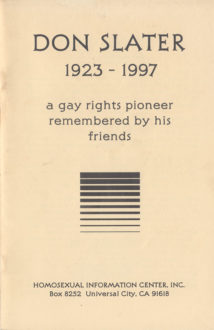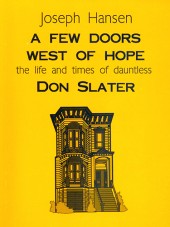 One Among Us
One Among Us
by Fred Frisbie
Don Slater:
a gay rights pioneer remembered by his friends
©1997 by Homosexual Information Center, Inc.
Jim Schneider, Chairman
Pp. 9–10
Second Printing, revised
Assembled, edited, and composed by Joseph Hansen
Laguna Beach, CA
The year was 1950. It was the rutting season. I brought home a handsome youth. He admired my house, my piano, my animal paintings, me!
He mentioned the Mattachine, a society to which he belonged, “sort of.” He said they met in homes, as I invited guests, to discuss current topics and, sometimes, have parties. He was certain they would be delighted to be guests of mine. Would I permit him to set a date?
Since he was undeniably enchanting, we scheduled a party, nothing heavy, for the end of the month. Its success was extraordinary.
Among the more spry guests was Don Slater. We danced together, melding as one. We chatted, joked, gossiped, we found each other out.
We were indeed stuck, forevermore.
And Tony, his heartstring, was charmed to meet and talk Spanish with my heartstring, called Luisa, an androgynous Puerto Rican angel. We four found such delight in one another, and in the promise of the Mattachine, that Luisa and I joined, the moment we were invited. Then we scheduled bi-weekly gatherings, and ran parties, and of course our friendship glowed and deepened.

One indelible memory of a charming scene recalls how the two, when they heard our auto horn, came rushing out the door of the Victorian house on Bunker Hill (in which they lived until the Hill was razed) to open the gate for us. Don was only in shorts, and Tony was putting on a shirt as they came running, smiling from ear to ear, like two little children, full of glee. Luisa and I were enchanted.
We also attended meetings in other homes. At one such meeting, a bold proposal was catapulted into our midst. One among us said,
There is such ferment in the subject matter of these meetings, we ought really to have documentation other than minutes. Why don’t we have a magazine?
We were thunderstruck by the sheer audacity of the idea.
These were the repressive 50s, when a white male could be arrested for walking through the Third street tunnel with a black companion.
Momentarily we were aghast at the suggestion of such open defiance of the oligarchy, and wondered if any news stand would display a magazine like that. Stunned silence followed.
Then we spontaneously divided into work groups to thresh out the mechanics of this exciting endeavor. Among us was a black school teacher who quoted Thomas Carlyle’s “A mystic bond of brotherhood makes all men one.” And so volume one, number one was gestated, named ONE, and dropped with a parturient thud that soon would be heard ‘round the world. Don worked feverishly among us, and would soon take the precious burden to the postoffice.

During succeeding years, our friendship deepened, though our viewpoints and congruency were often at odds. Eventually, in the early 1960s, Don and Billy Glover deviated from ONE, Inc., and started Tangents, a competing magazine, and an entity they called the Homosexual Information Center, [whose newsletter after the magazine ceased publication in early 1970] continued to report what was going on “in the life,” including literature.
Though I remained faithful to ONE in all this, I yet remained Don’s friend as person-to-person, shunning our public differences. Among other activities, we jointly reupholstered a grand sofa in old rose mohair, and worked together on repairs to his house, had pleasant visits, dinners, discussions of mutual interest, phone calls, etc.
I am, among other things, an artist, and Don took great interest in this. We both adored animals, and he kept many cats. One day a mongrel dog, woebegone, suffering from a pernicious skin infection along her back, appeared at Don’s gate. He immediately took her in, consoled her, treated her, and found, with great pleasure, that she was friendly to the cats.
When I saw her, three days after he’d rescued her, I was alarmed, and said she ought to be taken to the pound before she could infect the cats.
“The pound, indeed!” said he, and named her Melba, because her coat, what was left of it, was the color of Melba toast. When Don died, I took Melba home with me. She and I had become good friends after Don saved her. Fortunately, she had not heard my suggestion he dump her.
To sum Don up—he was a concerned person, perspicacious, quick, energetic, didactic, effervescent, helpful, a busy bee, a cyclist, a skier, and he liked me. Not fervently, but appropriately. At my last hospital visit, we kissed, mutually driven, as if in “Goodbye.”
©1997, 2017 by The Tangent Group. All rights reserved.
The HIC is grateful to Stephen Brzoska for his help in digitizing this text.

